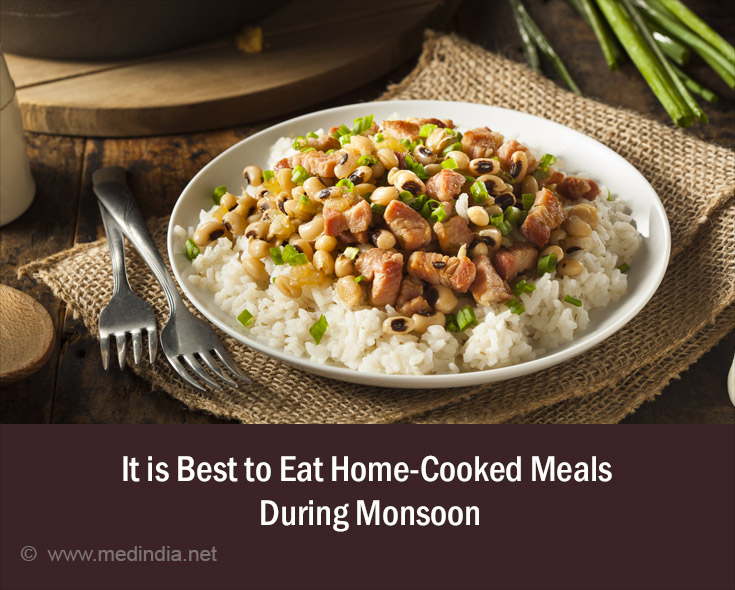- Impact of rainfall on diarrheal disease risk associated with unimproved water and sanitation - (https://pubmed.ncbi.nlm.nih.gov/24567318/)
- The association between temperature, rainfall and humidity with common climate sensitive infectious diseases in Bangladesh - (https://pubmed.ncbi.nlm.nih.gov/29928056/)
About
Monsoon, with its refreshing rains and cool breezes, is a season loved by many. However, it also brings various health challenges, particularly related to food. The damp and humid weather creates the perfect breeding ground for various germs and diseases, making it essential to be cautious about what we consume. One of the primary health advisories during this time is to avoid street food, as it poses significant risks. Here’s why skipping your favorite street snacks like dahibara, aludom, ghugni, kathirolls, or momos is crucial for your health during the monsoon.
Did You Know?
During the monsoon, bacteria like E. coli multiply rapidly due to high humidity, making street food more prone to contamination and increasing the risk of stomach infections!Health Risks Linked to Street Food During Monsoon
Doctors are witnessing a surge in patients suffering from gastroenteritis, diarrhea, dysentery, vomiting, and nausea during the rainy season(1✔ ✔Trusted Source
Impact of rainfall on diarrheal disease risk associated with unimproved water and sanitation
Go to source). The primary culprits? Contaminated food and water, which are rampant during the monsoon. The high humidity and fluctuating temperatures create an ideal environment for bacteria to thrive, leading to increased foodborne diseases(2✔ ✔Trusted Source
The association between temperature, rainfall and humidity with common climate sensitive infectious diseases in Bangladesh
Go to source).
Gastrointestinal Issues:
Increased bacterial activity during monsoon results in the contamination of food and drink, causing stomach pain, vomiting, nausea, and fever. Many cases are severe enough to require hospitalization. Maintaining hygiene, avoiding street food, and drinking boiled water are critical preventive measures.Unsanitary Cooking Conditions:
Street food is often prepared in unhygienic conditions. The water used may be contaminated, and the presence of flies and other insects exacerbates the risk of food contamination. The monsoon season sees a spike in the growth of E. coli bacteria, which are notorious for causing stomach infections.Waterborne Diseases:
Contaminated water during the monsoon also facilitates the spread of typhoid. Consume freshly cooked, healthy food and plenty of water to stay hydrated and avoid dehydration. It is also best to steer clear of junk, spicy, and unsanitary food to prevent health issues.How Monsoon Affects Digestion
During the monsoon, our digestive system becomes sluggish, leading to bloating, acidity, gas, and indigestion. The damp weather can make it harder for our bodies to process food efficiently. Eating street food, often rich in spices and oil, can exacerbate these digestive problems, making it harder for the body to cope.
Slow Digestion:
The digestion slows down in monsoon, making us more susceptible to issues like bloating and indigestion. Consuming street food can strain the digestive system further, leading to discomfort and illness.Healthy Eating Habits:
To maintain good health during monsoon, it’s essential to eat freshly cooked meals. Incorporate plenty of fruits, vegetables, and hydrating foods into your diet. Avoid oily, spicy, and junk food, as these can be hard to digest and may lead to health issues.
Tips for Staying Healthy During Monsoon
Avoid Street Food:
This cannot be stressed enough. Street food, while tempting, poses significant health risks during monsoon due to contamination and poor hygiene standards.Drink Boiled or Filtered Water:
Ensure that the water you drink is safe. Boiling water kills germs and bacteria, making it safe for consumption.Maintain Hygiene:
Wash your hands regularly, especially before eating. This simple habit can prevent a host of illnesses.Eat Freshly Cooked Food:
Home-cooked meals are your safest bet during the rainy season. Ensure that the food is cooked thoroughly to kill any harmful bacteria.Stay Hydrated:
Drink plenty of water, but make sure it’s clean and safe. Hydration is key to maintaining good health, especially in humid weather.Consume Immunity-Boosting Foods:
Include foods rich in vitamins and minerals to boost your immune system. Citrus fruits, ginger, garlic, and leafy greens can help strengthen your body’s defenses.Avoid Raw Food:
Raw food can harbor bacteria. Ensure that fruits and vegetables are washed thoroughly and, if possible, consume them cooked.
While monsoon brings much-needed relief from the scorching summer heat, it also necessitates a change in our eating habits. The risk of foodborne illnesses increases significantly during this season, making it imperative to avoid street food. By following these health guidelines and being mindful of what you consume, you can enjoy the monsoon season without compromising your health. Prioritize hygiene, eat freshly cooked meals, and stay hydrated to keep gastroenteritis, diarrhea, and other monsoon-related ailments at bay.









